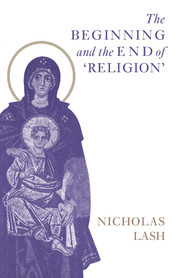Book contents
- Frontmatter
- Contents
- Preface
- PART ONE A MEETING-PLACE FOR TRUTH
- PART TWO EMERGING FROM MODERNITY
- 4 Observation, revelation and the posterity of Noah
- 5 On what kinds of things there are
- 6 Contemplation, metaphor and real knowledge
- 7 When did the theologians lose interest in theology?
- 8 Anselm seeking
- 9 Creation, courtesy and contemplation
- 10 Hollow centres and holy places
- 11 Hoping against hope, or Abraham's dilemma
- 12 Eagles and sheep: Christianity and the public order beyond modernity
- 13 Incarnation and determinate freedom
- 14 Beyond the end of history?
- List of works cited
- Index
10 - Hollow centres and holy places
Published online by Cambridge University Press: 05 March 2012
- Frontmatter
- Contents
- Preface
- PART ONE A MEETING-PLACE FOR TRUTH
- PART TWO EMERGING FROM MODERNITY
- 4 Observation, revelation and the posterity of Noah
- 5 On what kinds of things there are
- 6 Contemplation, metaphor and real knowledge
- 7 When did the theologians lose interest in theology?
- 8 Anselm seeking
- 9 Creation, courtesy and contemplation
- 10 Hollow centres and holy places
- 11 Hoping against hope, or Abraham's dilemma
- 12 Eagles and sheep: Christianity and the public order beyond modernity
- 13 Incarnation and determinate freedom
- 14 Beyond the end of history?
- List of works cited
- Index
Summary
THE ICARUS BAR
Perhaps the motto for our meeting might be Seamus Heaney's direction for the uncoding of all landscapes of ‘things founded clean on their own shapes, / Water and ground in their extremity’. We are gathered, this weekend, at an extremity of Europe, if not at the margin. But where would one find Europe's centre? A politician might choose Brussels, but a banker or a businessman would more likely opt for Frankfurt. There is no parable more poignant of the predicament of modern Europe than that provided, in the departure area at Frankfurt airport, by what journalists call a watering-hole, labelled in proud lights: ‘Bar Ikarus’.
There are, of course, other candidates for Europe's centre. It was from Rome, in 1991, that a hastily assembled Synod summoned ‘Europe’ to make a ‘choice for God’. No one seems quite sure what this means but (at least in England) suspicion of ‘Maastricht’ is, in part, bound up with half-formed fears that ancient and imperial forces gather strength, that caesaropapal banners are somewhere being unfurled. Meanwhile, in quite high places in the Catholic Church there seems to be, as Jean-Louis Schlegel recently remarked, ‘a marked ambivalence, not to say ominous confusion, over the notion of secularisation’.
Brussels? Frankfurt? Rome? The list of candidates for Europe's centre might now be extended to include Budapest, or Cracow.
- Type
- Chapter
- Information
- The Beginning and the End of 'Religion' , pp. 183 - 198Publisher: Cambridge University PressPrint publication year: 1996
- 1
- Cited by



